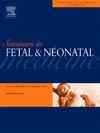早产儿需要多少氨基酸和蛋白质?
IF 2.9
3区 医学
Q1 PEDIATRICS
引用次数: 0
摘要
通过胃肠道消化或静脉输注获得的蛋白质和氨基酸是相同胎龄的胎儿和早产儿正常代谢、生长和神经发育结果的基础。许多研究支持至少3.0-3.5 g/kg/天的蛋白质或氨基酸,以达到正常的氮/蛋白质平衡和生长速度,并在妊娠后期,无论是胎儿还是早产儿瘦体重的大幅度增加;这种关系是直接和线性的。妊娠早期的快速生长比晚期早产儿或足月婴儿需要更多的氨基酸和蛋白质。蛋白质的合成和增加也需要足够的能量,但超过120千卡/公斤/天,能量大部分被转移到脂肪生产,而不是瘦体重的增长。最佳的静脉注射氨基酸解决方案仍有待开发,成熟的母乳和供体母乳需要补充蛋白质以达到适当的蛋白质平衡和生长。额外补充生长因子可能会增加增加的蛋白质摄入量和强化剂。虽然过量摄入氨基酸和/或蛋白质不会促进生长发育,甚至可能有害,但低于所需量的氨基酸和/或蛋白质摄入会导致较差的结果,应该避免。本文章由计算机程序翻译,如有差异,请以英文原文为准。
Amino acids and protein for preterm infants: How much and for what?
Protein and amino acids derived from protein digestion in the gastrointestinal tract or from intravenous infusions are fundamental for normal metabolism, growth, and neurodevelopmental outcomes in the fetus and the preterm infant of the same gestational age. Many studies support that at least 3.0–3.5 g/kg/day of protein or amino acids are needed to achieve normal nitrogen/protein balance and growth rates and the large fractional increase of lean mass in later gestation, either in the fetus or the preterm infant; this relationship is direct and linear. Faster growth rates in earlier gestation require more amino acids and protein than the late preterm or term infant. Protein synthesis and accretion also require sufficient energy, but above ∼120 kcal/kg/day, energy is largely diverted to fat production but not lean mass growth. Optimal IV amino acid solutions remain to be developed, and mature maternal milk and donor human milk require protein supplements to achieve appropriate protein balance and growth. Additional supplements of growth factors might augment increased protein intakes and fortifiers. While excess amino acid and/or protein intakes do not promote growth or development and might even be harmful, providing less than the amounts required guarantees poorer outcomes and should be avoided.
求助全文
通过发布文献求助,成功后即可免费获取论文全文。
去求助
来源期刊
CiteScore
6.40
自引率
3.30%
发文量
49
审稿时长
6-12 weeks
期刊介绍:
Seminars in Fetal & Neonatal Medicine (formerly Seminars in Neonatology) is a bi-monthly journal which publishes topic-based issues, including current ''Hot Topics'' on the latest advances in fetal and neonatal medicine. The Journal is of interest to obstetricians and maternal-fetal medicine specialists.
The Journal commissions review-based content covering current clinical opinion on the care and treatment of the pregnant patient and the neonate and draws on the necessary specialist knowledge, including that of the pediatric pulmonologist, the pediatric infectious disease specialist, the surgeon, as well as the general pediatrician and obstetrician.
Each topic-based issue is edited by an authority in their field and contains 8-10 articles.
Seminars in Fetal & Neonatal Medicine provides:
• Coverage of major developments in neonatal care;
• Value to practising neonatologists, consultant and trainee pediatricians, obstetricians, midwives and fetal medicine specialists wishing to extend their knowledge in this field;
• Up-to-date information in an attractive and relevant format.

 求助内容:
求助内容: 应助结果提醒方式:
应助结果提醒方式:


